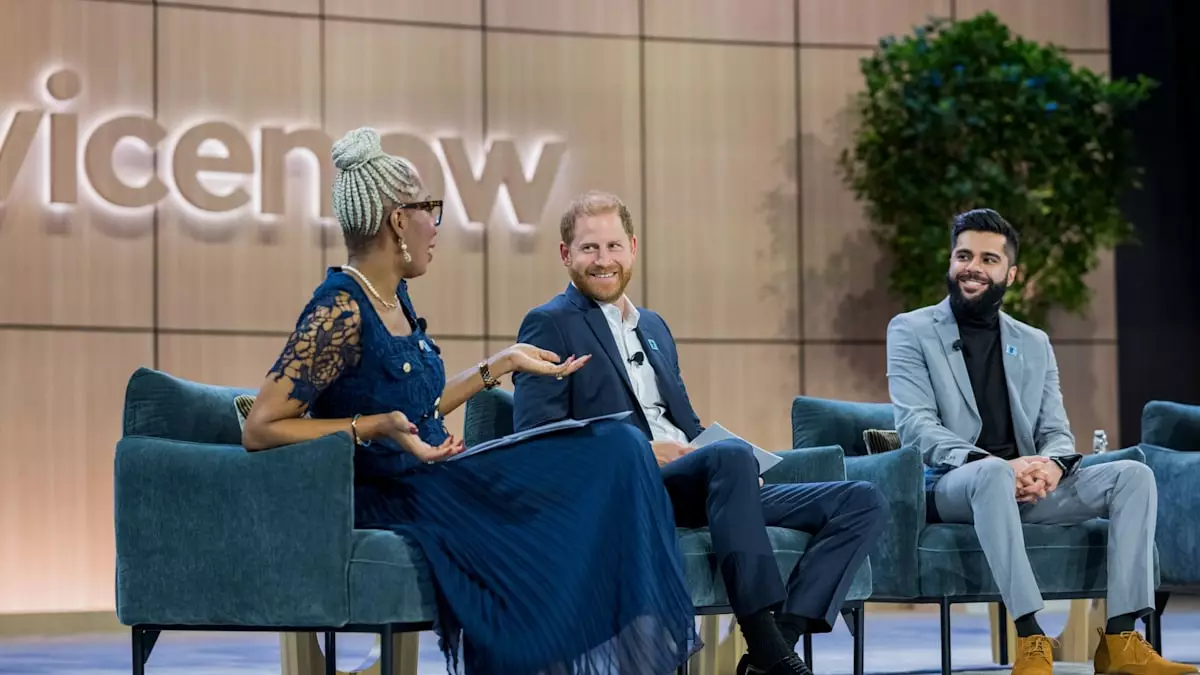Prince Harry, the Duke of Sussex, took to the stage at a recent charity gala in Las Vegas, radiating positivity as he celebrated a significant milestone — the sixth birthday of his son, Prince Archie. The event was not just a personal celebration; it marked the launch of the Diana Award’s ambitious Pledge To Invest initiative, aimed at fostering youth leadership. The synergy between his fatherly pride and professional passion was palpable as he spoke to a crowd that shared his aspirations for the youth.
Dressed casually in a blue shirt layered with a white open-collared shirt, Prince Harry engaged the audience with enthusiasm and purpose. His message transcended mere platitudes; it was a passionate call to action aimed at businesses and organizations worldwide to invest in the potential of young people. “Through The Diana Award, I’ve had the privilege of meeting young people who have turned adversity into action. That’s not just inspiring — it’s the kind of untapped potential we can’t afford to overlook,” he declared, emphasizing the urgency of the cause.
A Shift in Leadership Paradigms
Harry’s insistence on youth leadership reflects a significant generational shift. No longer waiting for conventional pathways or established systems, today’s youth are innovating and leading on their terms. “This generation isn’t waiting for permission to lead — they are already doing it,” he asserted. His acknowledgment of their qualities, such as emotional intelligence and social awareness, highlights a crucial evolution in leadership styles. Unlike previous generations, today’s youth are unafraid to confront issues such as mental health, illustrating a level of candor and boldness that reshapes our understanding of leadership.
The Duke’s remarks echo a broader cultural need to dismantle outdated structures that have historically marginalized young voices. He admonished leaders and stakeholders to rethink their approaches in fostering inclusivity. “Far too many young people are locked out of leadership pipelines because we’ve failed to build truly inclusive and accessible pathways,” Harry pointed out, forcing us to reckon with the systemic barriers that inhibit youth participation in leadership roles.
The Role of The Diana Award
Founded in memory of Diana, Princess of Wales, The Diana Award encapsulates a belief in the transformative power of youth. By creating platforms for young leaders, the initiative not only honors her legacy but also ensures that her vision for a more just and equitable world is carried forward. This year’s event saw Harry share the spotlight with Dr. Tessy Ojo CBE, the charity’s CEO, alongside two inspiring young leaders — Sikander “Sonny” Khan from Michigan and Christina Williams from Jamaica. Together, they demonstrated the diversity and potential of youth voices, promoting the philosophies that underpin The Diana Award’s mission.
The contrasting celebrations of Prince Archie’s birthday underscored the duality of Harry’s life. While he celebrated the personal joy of fatherhood, the weight of his royal heritage and its complexities loomed large. Just hours before his charity appearance, his wife, the Duchess of Sussex, shared poignant sentiments about their son on social media, capturing a snapshot of familial love amidst the challenges they face as a modern royal family living far from traditional expectations.
Broader Implications for the Royal Family
Harry’s presence in Las Vegas came at a time of heightened tensions within the royal family, particularly following his candid remarks about his estranged relationship with King Charles. Such statements highlight the tension between personal autonomy and royal duty that Harry has grappled with since stepping back from royal responsibilities. His emphasis on listening to the new generation resonates not just in a philanthropic context but also within the walls of Buckingham Palace, where traditional dynamics are being challenged.
The world’s gaze on Harry’s journey inspires a broader conversation about adaptability in leadership, especially within historically rigid institutions like the monarchy. His experiences serve as a reminder that the future demands leaders who are both authentic and agile — qualities that the next generation embodies naturally. The call for inclusivity, a theme that threaded through his remarks, invites not just reflection but action toward a more equitable world.

